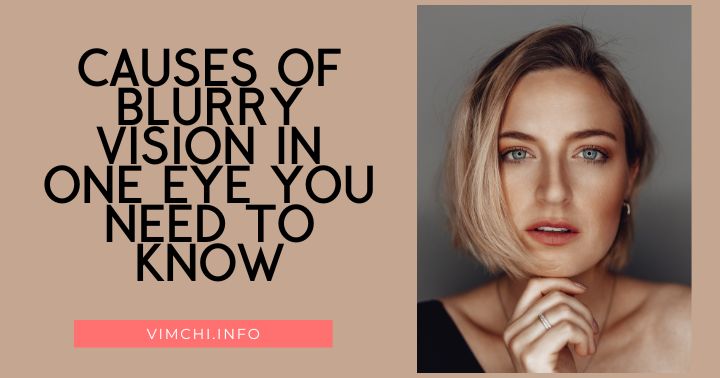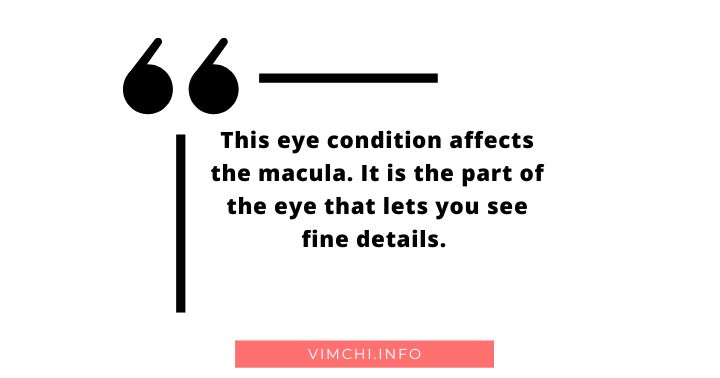
Having a blurry vision in one eye can be alarming. Thankfully, the most common causes are not serious. Nevertheless, it is still vital that you consult your doctor. It could be that it is a symptom of a more serious medical condition.
Should You Be Worried If You Experience Blurry Vision in One Eye?
Because you rely on your vision to interact with the world, it is unnerving when you have blurry vision. But before you get worried, you should understand its potential cause.
In most cases, it is not a life-threatening condition. However, if it is sudden, it can mean that you need emergency treatment. Knowing the signs can help decide whether to seek help or not.
When to Seek Medical Attention?
If your blurry vision is accompanied by any of the following symptoms, you should seek medical attention:
A sudden, serious, debilitating headache
- Can’t stay awake
- Loss of consciousness
- Inability to raise arms
- Slurred speech
If you have diabetes, you should seek help right away.
What are the Possible Causes of Blurry Vision in One Eye?
1.) Stroke
A stroke affects your vision. If your blurry vision is accompanied by disorientation, imbalance, difficulty speaking or numbness seek medical health immediately.
It is one of the causes of blurry vision that prompts you to visit the nearest medical hospital for immediate treatment.
2.) Refractive Errors
They are the most common cause of eye problems. They include nearsightedness, farsightedness, astigmatism, and presbyopia.
If this is your case, they do not require immediate medical attention. But some people may need surgery to correct the errors.
3.) Eye Infection
An eye infection can be caused by a lot of things — bacteria, fungi, and viruses. If you have an infection in your eye, you may experience swelling, pain, redness, and discharge around the affected eye.
Conjunctivitis is an eye infection that can cause blurry vision. You may use eyedrops for this situation. However, if your case is severe, you would need medical treatment.
4.) Migraine
One of the common symptoms of migraine is blurry vision. This condition causes moderate to severe headaches.
The blurry vision can last up to 60 minutes if you are experiencing an aura.
You don’t need to go to the nearest emergency center. An over-the-counter pain reliever can do the trick. But if the episode is more frequent, you may need to see a doctor so you can take prescription medicines.
5.) Cataract
This is a common age-related vision issue. The blurry vision can happen in one or both eyes. It also includes difficulty seeing at night or reading. If you see a halo around lights, you should consider having your eyes checked.
Keep in mind that the only treatment for cataracts is surgery. Your surgeon will simply replace the clouded lens with an artificial one.
Cataract surgery is not an emergency treatment. However, if it is already affecting your daily activities, you need to have it ASAP.
Read: How to See a Doctor When You Don’t Have Health Insurance?
6.) Macular Degeneration

This eye condition affects the macula. It is the part of the eye that lets you see fine details.
The blurry vision can start in one eye. But if it progresses, it can cause sharp or central vision loss.
As you get older, your macula gets thinner, resulting in blurry vision. Dry AMD is the most common form of macular age-related macular degeneration.
Unfortunately, dry AMD does not have a cure. But you can slow it down by eating a balanced diet, maintaining healthy blood pressure, and stopping smoking.
Your doctor may also prescribe anti-vascular endothelial growth factor drugs. Or a laser treatment may be necessary.
7.) Diabetes
Many people living with diabetes will experience a sign of eye disease. And one of the symptoms that your diabetes has affected your eyes is when you experience blurry vision in one eye.
In addition to blurry vision, you also experience dark strings, and flashes of light, and your vision may change from day to day.
If you have diabetes, you need to undergo dilated eye exam so that your doctor can see early signs of eye damage.
To lower your risk of experiencing this symptom, make sure to manage your blood glucose levels. That’s why you need to follow a healthy diet and get regular exercise.
A healthy lifestyle can make a huge difference to your diabetes. You can also prevent undergoing laser procedures.
How to Keep Your Eyes Healthy?
You must never take your eyes for granted. Remember that to maintain good eye health, you need to eat the right nutrients, like omega-3 fatty acids. Consuming lutein, zinc, and vitamin C can ward off age-related vision.
Stop Smoking
Smoking can lead to cataracts, macular degeneration, and damage to the macular. If you are a heavy smoker, you must kick this habit immediately. This is especially true if you’re already experiencing a blurry vision in one eye.
Protect Eyes with Sunglasses
The right pair of sunglasses can protect your eyes from the harmful effects of UV rays. A cataract may happen if you have too much UV exposure. It also leads to macular degeneration.
When shopping for the right shades, look for a pair that can block up to 99% of UVA and UVB rays. Choose wraparound lenses to protect the side of your eyes.
Polarized lenses can reduce glare while driving.
Should You Take Lutein on Eye?
Lutein can help protect your eyes and maintain their health. It is a known carotenoid that can improve or prevent age-related macular disease.
Studies reported that it can have positive effects on various clinical conditions. It can ameliorate cognitive function and decrease the risk of cancer.
To start protecting your eyes against eye diseases, shop for lutein products here. This vision health protection is an effective way to ward off cataracts and other eye diseases that can lead to blurry vision in one eye.
Since there are several causes of blurry vision in one eye, you should see your doctor immediately. The cause can be innocuous or it can be a serious condition.
Speak Now ... Or Forever Hold Your Peace